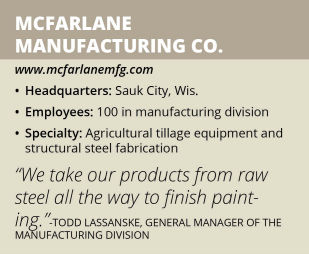McFarlane Manufacturing Co.
Most of agriculture relies on something growing from a seed, but to do that, the seed has to be planted successfully. Preparing soil for planting in as few operations as possible is the goal of the agricultural tillage equipment designed and manufactured by third-generation, family owned McFarlane Manufacturing Co.
“We consider ourselves to be the seedbed specialist,” explains Todd Lassanske, general manager of the manufacturing division. “We’re preparing the seedbed before planting, which improves the productivity, robustness and maintenance of the soil by integrating the residues from the prior year.”
Incorporating the residues of corn stalks, soybeans and wheat into the ground in the fall, spring or both so they can decompose and fertilize the soil is the specialty of most of the equipment McFarlane manufactures. The equipment is designed to do several jobs so the number of times a farmer has to pull equipment through his fields with a tractor is reduced.
“We try to find innovative ways to reduce the number of passes, the number of operations and the cost of the inputs,” Lassanske says. “If you have a very even field and a very good seedbed, you can drive the planter at the maximum speed with high reliability of planting.”
McFarlane Manufacturing Co. produces four major lines of tillage products in the 130,000-square-foot plant at its headquarters in Sauk City, Wis. “Those tillage products are all manufactured here in the United States pretty much exclusively,” Lassanske says. “We’re very vertical. We take our products from raw steel all the way to finish painting. We buy some components such as tires, bearings, springs and cylinders, but beyond that, most everything is produced right here.”
The company also fabricates structural steel, mostly for construction, which tends to be countercyclical to the agricultural equipment market. So welders can be shifted from one product line to the other to meet demand, and the diversification helps the company’s revenue overall.
 Always Redesigning
Always Redesigning
McFarlane’s engineers are always redesigning the company’s equipment. For example, new genetically modified strains of corn have different properties than previous ones. “The stalks are very robust and do not decompose as quickly as they once did,” Lassanske says. “That certainly creates some of our challenges. We like to find niches that we can do better than anybody else. That’s our modus operandi.”
One of those niches is a McFarlane product called INCITETM. “We’ve coined the term Universal TillageTM, because we have the INCITETMmachine now that can do a shallow, aggressive or vertical tillage pass, as opposed to requiring a unique machine to do each one,” Lassanske says. “The farmer can adjust the machine from one type of tillage to the next without getting out of the tractor cab.”
All of McFarlane’s products are custom manufactured. Approximately three years ago, the company brought in a Quick Response Manufacturing (QRM) team from the University of Wisconsin-Madison with whose help McFarlane changed its workflow and reduced its inventories and batch size. “We work with suppliers to reduce their lead times and batch sizes so we can have a minimal amount of inventory on hand to meet our customers’ needs,” Lassanske says. “Generally, we can produce a product within a week to 10 days to order, if not sooner.”
Among the different manufacturing processes employed by McFarlane are plasma tables to cut out flat metal stock, press brakes to form it, full-size presses, wire formers, CNC machining centers, saws that cut tubing and steel, and welding, painting and assembling equipment.
One of the advantages of McFarlane’s vertical integration is that the company is not dependent on suppliers’ production schedules. This means McFarlane can reduce the number of components from other suppliers that it would have to keep in stock, because it does not have to meet suppliers’ minimum order requirements. The company can also produce lower quantities of its products, and in many cases, it can produce parts at lower cost than suppliers would.
McFarlane uses reliable suppliers for specialized products it does not want to produce itself, such as hydraulic cylinders, wheel bearings or tires. It maintains longstanding relationships with most of its good suppliers, in some cases for decades.
The company has always emphasized the importance of safety and has an accident rate below the national average. Lassanske attributes this to the company’s employees. “They are the ones who are designing, creating, building and selling our products,” he notes. “They are just a fabulous team of people. They are the ones that are making it happen”.
“I’m most proud of the teamwork essentially related to communication,” he continues. “We’ve had a cultural shift here the last couple of years, and we now have morning standup meetings in every area. There is virtually nothing that happens in the company – such as a safety issue or a corrective action – that doesn’t get communicated to everybody within the organization within 24 hours. So we have a very high awareness and focus on safety and quality.”
For the future, Lassanske plans to introduce more automation to the manufacturing process such as robotic welders to improve the company’s throughput. He attributes the company’s success to its employees and having an innovative product. “We’re what many folks refer to as a short-line manufacturer as opposed to a full-line manufacturer like John Deere or Case. We supply a very specific product that is known to be innovative and offers a unique value to our customers.”